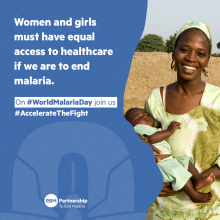At the recent African Union Summit in Niamey, Niger, I was asked how we can promote synergies in our efforts to fight malaria and neglected tropical diseases (NTDs)—diseases that affect the poorest and most vulnerable people around the world, especially in Africa. My response was simple: focus on the patient, not the disease.
As a medical doctor and an international public health professional, I have witnessed first-hand the impacts of the so-called ‘vertical’ approach to healthcare in countries grappling with multiple challenges. Health professionals there are often called to interact with multiple partners who tend to focus on their specific disease—sometimes at the expense of the overall strength of the public health systems.
However, when done effectively and in coordination with each other, disease-specific programmes can and should respond to the broader healthcare needs of the countries and communities involved, and contribute to building stronger, more sustainable and patient-centered health systems.
Malaria is one of the world’s most burdensome infectious diseases, the cause of an estimated 219 million cases and 435,000 deaths in 2017. Since 2000, global efforts to control and eliminate this disease have saved 7 million lives and prevented 1 billion cases of malaria.
Addressing malaria has helped countries improve health systems, increase access to essential health services, and advance Universal Health Coverage (UHC) by providing equitable and financially accessible health services to the most vulnerable.
During the forthcoming 74th United Nations General Assembly, member States will convene for a high-level meeting on UHC and adopt a political declaration on moving together to build a healthier world.
Each year, 1 billion people do not receive the healthcare they need, and 100 million fall into poverty due to unaffordable health expenses. UHC would provide everyone, everywhere with accessible, affordable, and sustainable health services.
The RBM Partnership to End Malaria’s message is clear: elimination of malaria directly supports UHC; it can be the yardstick by which the success of UHC is measured. By relieving the disease burden, we can increase the capacity of health systems, while also strengthening primary healthcare. Sustaining malaria elimination efforts is also key to preventing a resurgence, which would overwhelm health systems.
However, increased investment is needed to maintain progress and address the burden of the disease, particularly in sub-Saharan Africa, where malaria cases are increasing in some countries, while continuing to support elimination efforts in lower burden countries.
Conversely, malaria efforts stand to greatly benefit from universal coverage of prevention, diagnosis, and treatment for the disease, with the potential to reduce malaria cases and deaths, especially for hard-to-reach populations.
Strong health systems are the foundation of effective response to malaria, NTDs and other diseases. Effectively integrating malaria and other diseases affecting the poorest and the most vulnerable as part of UHC will result in better health and wellbeing of millions of people worldwide. And by focusing on the individuals we seek to reach, we can greatly enhance synergies across disease-specific programmes, for the benefit of all.
Dr Abdourahmane Diallo MD, MPH
Latest Blogs



